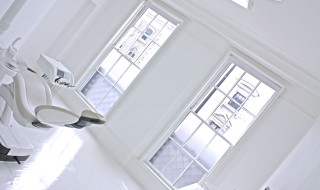 Director of The Wellington Clinic in London, Marjan Goodacre explains why going the extra mile and meticulous planning can help in the quest for beautiful smiles and content patients
Director of The Wellington Clinic in London, Marjan Goodacre explains why going the extra mile and meticulous planning can help in the quest for beautiful smiles and content patients
Can you tell us a bit about your background?
MG: I was born and raised in London and Essex. I graduated from Guys, Kings and St Thomas’s in 2004. I was keen to set up my own clinic from the day I chose to study dentistry. In 2009 I set up The Wellington Clinic. I live in south west London with my husband who is also a dentist and my two daughters who are now two and four years old.
What or who made you choose a career in dentistry and why did you focus on cosmetic dentistry?
MG: Since visiting the dentist as a child I was interested in the profession. I remember being intrigued by the technology of an OPG at the age of seven and I was always curious about the equipment and what or how things were done at the dental clinic.
I do have a special interest in cosmetic dentistry and it doesn’t mean that I only do veneers. I just like to do beautiful dentistry! I like my fillings to look like natural teeth and my crowns and veneers to look like natural teeth. I find it encouraging to perform the type of dentistry that the next dentist struggles to identify. I love to improve the appearance of the smile as I know it changes the appearance of the face and the person overall. My interest also extends to facial aesthetics using Botox and fillers. I enjoy enhancing a person’s natural beauty in such a way that the treatment is not obvious. It makes me happy to see the happiness and confidence I can bring someone.
You also do a lot of short-term orthodontics – can you tell us about that?
MG: I do think it is very important to provide orthodontics. A large number of people only require minor alignment (which is where short term orthodontics comes in) but this can make a huge difference to the smile and the face. I have many patients who come to me for cosmetic improvement of their smiles and I find orthodontics to not only improve the final appearance of any planned work but also to make sure any cosmetic treatments are as conservative as they can be. I hate removing good tooth tissue and will always work to preserve it. I believe if any treatment is being considered for cosmetic reasons it should be long term and every effort should be made to increase longevity.
I also have an orthodontist at my clinic for the more complex orthodontics and we work together on combined multi-disciplinary cases including those requiring orthognathic surgery.
Can you tell us about your work in implant dentistry and full mouth reconstruction?
MG: I find full mouth reconstruction with or without implants very satisfying. I get excited when such a case comes through the door. The journey can be a long one but I enjoy the relationship you build with the person and seeing how it is a life changing experience for that person.
I do tend to go to the nth degree with meticulous planning and going through all the option pathways and the order in which to do it in but once the planning is done the rest is straightforward. I have treated a number of severely worn dentitions and have seen amazing changes in not only the appearance but also in their function and grinding habits. My work will always involve implants where there are missing teeth. I tend to focus more on the restorative side of implant dentistry but will always be involved in the positioning and placement of the implant to ensure the planned restoration specifications can be achieved.
What have been your best decisions? In hindsight, would you have done anything differently?
MG: Setting up my own clinic was the best decision I have made and having the courage to set up a squat especially during the peak of the recession. It enabled me to provide the dentistry I wanted to do, the dentistry I would want to have in my own mouth. It gave me the freedom to choose the materials and technologies I wanted and to spend the time I wanted to do it in. I wouldn’t have done anything differently.
Your practice has a won some awards – how important are they to you and how does it help the practice?
MG: The awards have been amazing. We are very thankful for them. They gave my team and I the confidence, enthusiasm and drive to continue to achieve the best we can. I think the patients also find it exciting and reassuring that we have been recognised within the industry.
How important is patient communication to you?
MG: I truly believe that patient communication is the most important factor for the success of any relationship, treatment or business. If we all spent more time developing our communication skills we would not only do better in all aspects of our work but we would be happier as a result. I am always learning new communication techniques whether it is from my patients or from new concepts and ideas or new technologies and adjuncts; they all have their place in practice.
How do you stay abreast of modern techniques?
MG: I go to many conferences, lectures, study clubs and courses. I generally have too many CPD hours but I find that even if you pick up one good piece of advice or information from an entire conference it will make a big difference in your work and practice. It’s very easy to think you know it all and that you couldn’t learn anymore and sometimes you do need to force yourself to take the time out of work to go to conferences. I have never regretted going to any conference.
 Professionally, what are you most proud of?
Professionally, what are you most proud of?
MG: My clinic and achieving the dentistry I have always aspired to do.
Where do you get your motivation and drive from?
MG: I really enjoy dentistry so much of my motivation and drive comes from my everyday work. Making my patients happy is a big motivator for me.
Conferences also inspire me and I enjoy bringing new techniques and ideas back to my clinic, although I have found it is important to put them in to place straight away otherwise unfortunately they get forgotten.
How do you relax in your spare time? How do you balance work and family life?
MG: My lovely girls help to keep a balance between work and life. Whether my husband being a dentist helps the balance I’m not sure but we are a great team so that’s lucky! As a word of advice for anyone deciding whether to set up a practice generally there is no balance and it is just work and more work. The list of things to do is never ending so I have learnt to occasionally just stop and take some time out. I try to do some yoga when I can but I definitely need to take more holidays.
What lessons have you learned in the course of your career so far?
MG: Continue to learn. You never know it all! Also, dentistry is changing every day and it’s so important to keep on top of the new materials and technologies. It’s very exciting to see what the future of dentistry holds.
Do you have any regrets? What has been your biggest mistake?
MG: I have no regrets so far and I don’t think there have been any big mistakes. Maybe I just don’t consider them that way and will make the most of the choices I have made.
What are your plans for the future?
MG: I’m ready for the next big project! I’m yet to decide what it is!
Fact file
Qualifications: BDS MFDS MFGDPRCS Eng
Position: Director of The Wellington Clinic
Dental interests: Cosmetic dentistry and facial aesthetics
Interests out of dentistry: Yoga and spending time with my children


